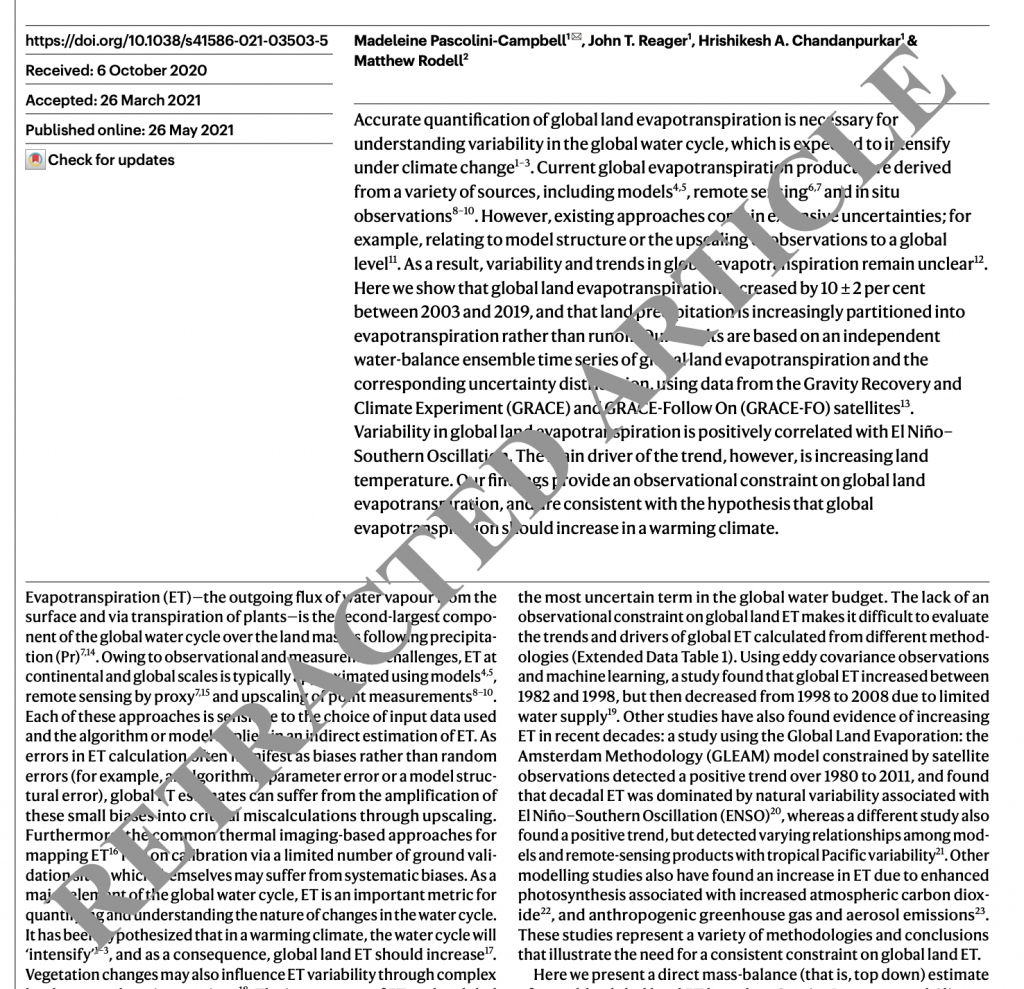The authors of a 2021 Nature paper on how climate change might affect the amount of evaporation from the earth’s land surface have retracted the article after learning of a crucial error in their analysis.
The crux of the paper, titled “A 10 per cent increase in global land evapotranspiration from 2003 to 2019,” was the finding that:
Variability in global land evapotranspiration is positively correlated with El Niño–Southern Oscillation. The main driver of the trend, however, is increasing land temperature. Our findings provide an observational constraint on global land evapotranspiration, and are consistent with the hypothesis that global evapotranspiration should increase in a warming climate.
In other words, according to the authors – from a pair of NASA labs in California and Maryland – the rate of evapotranspiration over that 17-year-period was twice as high as previous estimates. As the lead author, Madeleine Pascolini-Campbell, said in this press release (Wayback Machine link) from NASA:
Images of melting glaciers and shrinking ice sheets are a palpable way for us to understand the impacts of global warming … But dramatic changes are also happening to other key components of our planet’s water cycle that aren’t so visible, such as when water evaporates from the land before it can enter the rivers as runoff.
The study garnered some attention, with articles in the trade press, such as this one in Phys.org and this coverage in CarbonBrief.
But as the retraction notice explains, that conclusion was incorrect:
In this article, we calculated global land evapotranspiration for 2003 to 2019 using a mass-balance approach. To do this, we calculated evapotranspiration as the residual of the water balance, using an ensemble of datasets for precipitation, discharge and total water storage change. We made an error in calculating the global mean precipitation: we used arithmetic averaging to calculate the mean, instead of calculating a spatially weighted mean to account for the changing grid box size with latitude. As a result, the magnitudes of the global mean precipitation time series were underestimated. This impacted the subsequent calculation of global mean evapotranspiration, resulting in the mean evapotranspiration values being underestimated and altering some results. We are therefore retracting this article. We thank Ning Ma and others for bringing this error to our attention.
Ma is a climate researcher with the Chinese Academy of Sciences in Beijing.
Pascolini-Campbell has not responded to a request for comment.
Like Retraction Watch? You can make a one-time tax-deductible contribution by PayPal or by Square, or a monthly tax-deductible donation by Paypal to support our work, follow us on Twitter, like us on Facebook, add us to your RSS reader, or subscribe to our daily digest. If you find a retraction that’s not in our database, you can let us know here. For comments or feedback, email us at [email protected].

Sad. Thank god there are still some capable and honest researchers in this field, albeit only in the People’s Republic of China.
The retraction was because the UNDERESTIMATED the change in evapotranspiration. In other words, it is worse than they said in their study.
“As a result, the magnitudes of the global mean precipitation time series were underestimated.” They underestimated the precipitation, which means that they did indeed overestimated the role of evapotranspiration.
Am I reading this right?
It says that their analysis underestimated the mean precipitation and therefore ended up underestimating evapotranspiration?
That means that the increase in evapotranspiration over the 16 year time window was greater than 10%?
I hope that they republish with the corrected numbers – it sounds like things are worse than the original paper suggested.
No. It means the opposite. The mistake in use of the area for calculation greatly increased the estimated evaporative effect thus overestimating it’s role in climate change
That’s how I understood it too.
Thank god there are still some capable and honest researchers in this field, especially when they make mistakes, albeit only all the people mentioned in this article.
This tells us not to rely on others’ calculations. Do your work and be confident in results.
One retracted, Chinese-authored article in the journal “Atmospheric Research”, an Elsevier title, is here.
https://doi.org/10.1016/j.atmosres.2021.105873
Should be posted at Retraction Watch.